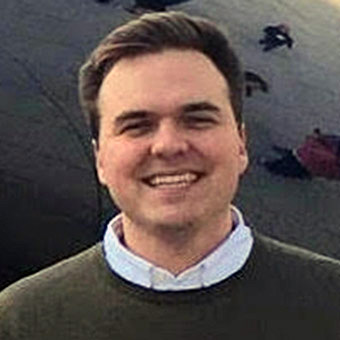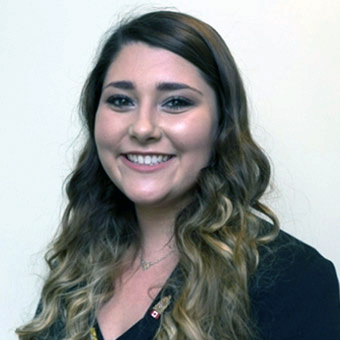2017-18 Student Delegates
The 2017-18 Student Delegate program was led by Anna Khandros, alumni and student engagement mentor and adviser for the ENACT Network .
Myeisha Boyd
University of Hartford
Class of 2017
 Myeisha Boyd is a democracy fellow for FairVote. She recently graduated from the University of Hartford in Connecticut, where she majored in politics and government.
Myeisha Boyd is a democracy fellow for FairVote. She recently graduated from the University of Hartford in Connecticut, where she majored in politics and government.
Boyd's interest in politics and policy begin as an intern in the office of U.S. Sen. Richard Blumenthal (D-Conn.) while assisting with constituent casework. As a college student, Boyd took advantage of all the opportunities that came her way. She participated in the Washington Semester Program at American University in Washington, D.C., where she had the opportunity to serve as a student volunteer in the Office of Presidential Correspondence for President Barack Obama. In addition, during her senior year of college she worked both as a field organizer for the Hillary Clinton campaign and as a legislative aide intern in the office of Hartford Mayor Luke Bronin.
Boyd was introduced to the ENACT Network while taking the American Public Policy course with Professor Katharine Owens at the University of Hartford. She believes that ENACT is a great resource for college students because it allows them to work on issues that they care about while connecting directly with the legislator who introduces the bill.
Boyd is serving as an ENACT student delegate because she wants to be a part of an organization that helps mobilize and encourage students to be engaged citizens in their communities, especially at the state level. She hopes to help students understand the power of their voice and how rewarding it is to advocate for issues that they care about.
Marian Gardner
Brandeis University
Class of 2018
 In spring 2017, Marian Gardner and a partner worked on Massachusetts' Higher Education Equity Act (HD.644/SD.669) as part of the ENACT course Advocacy for Policy Change.
In spring 2017, Marian Gardner and a partner worked on Massachusetts' Higher Education Equity Act (HD.644/SD.669) as part of the ENACT course Advocacy for Policy Change.
"This course taught me that I have power and it enabled me to grasp the difference any single person can make through involvement in local politics, either by running for office or being a citizen advocate," said Gardner, a student at Brandeis University. "Although at times the legislative process is slow and discouraging, and immediate results are hard to come by, it is important to be patient and maintain passion and persistence necessary to effect change."
As a student delegate, Gardner hopes to both educate and engage her peers. "I would like to focus on campus organizations that represent minorities because minorities are most vulnerable to decisions at the State House," she said. "I believe it is important to engage and teach them how to mobilize, to challenge or to promote policies that personally affect them."
Expand All
I am so grateful for the opportunity to be part of the first cohort of ENACT student delegates. I began my work as a delegate in August, when I attended the National Conference of State Legislatures' 2017 Legislative Summit. There, I networked with legislators from across the country on behalf of ENACT.
The knowledge and the skills I gained from the ENACT course informed my mentorship to ENACT students during the school year. Along with the other fellows, I helped students navigate the legislative process and be effective advocates. This included connecting students to community organizations, pointing students to research tools and creating guides on how to make campaign storybook and an advocacy video on a bill to engage legislators. Additionally, I helped organize workshop sessions to help students prepare for their Present and Defend, when they engage in face-to-face advocacy with faculty and community members. It was rewarding to see the tools created by student delegates helping students gain confidence in their ability to advocate for their bill.
I noticed that once students understood the importance of their role as citizen advocates, they became even more engaged. One group I worked closely with was very passionate about their bill, which sought to address sexual harassment on college campuses. They worked with a coalition to organize a film screening event and a rally to educate the community and garner more support for their bill. One student asked me about my experience working at the Massachusetts State House because the ENACT course had inspired him to apply to a legislative aide position.
The Student Delegate program had a mixture of current students and alumni from four different universities who advocated for bills addressing diverse issues. As a result of our varied backgrounds, we each brought different perspectives and ideas and worked together to advance our common goal of increasing civic participation among our peers. It was a collaborative and creative environment and, under the leadership of David Weinstein, ENACT coordinator, and Anna Khandros, ENACT student and alumni engagement representative, we helped shape the Student Delegate program.
In addition to helping ENACT students, we were also learning from one another. I learned about graduate school and career opportunities in politics from the student delegates who graduated and from Anna Khandros. Miranda, one of the student delegates, and I connected because we both had sought internship opportunities at the State House after taking the ENACT course. She was interning at the Maine State House, and I had worked at the Massachusetts State House under Rep. Brian Murray. Through our discussions about our experiences, we learned about how politics played out in the two states. I really enjoyed learning from my fellow student delegates.
As a student delegate, I attended the ENACT Forum on Women's Political Engagement, where Massachusetts state Sen. Cindy Friedman and former New Hampshire Speaker of the House Terie Norelli discussed their careers in politics and political advocacy. This was a powerful and informative event because, as a Black woman, I am one of the least-represented group in politics. I learned that women are much less likely than men to think they are qualified to run for office, and women are more risk averse than their male counterparts. Senator Friedman and Speaker Norelli stressed the importance of having more women run for political office, and they urged young women in the audience to ask themselves, "Why not me?"
Women need to create their own seat at the political table and participate in decision-making that affects them and other marginalized groups. I remember walking away from the event feeling inspired to believe in capabilities and ask myself, "Why not me?" This is why ENACT is important.
Mark Hickey
Hendrix College
Class of 2017
 Mark Hickey is a recent graduate of Hendrix College in Arkansas, where he obtained a bachelor's degree in politics. He has since moved to Washington, D.C., but still has a passion for the work and advocacy that takes place in state houses across the country. Currently, he works in political consulting that impacts nearly every level of government.
Mark Hickey is a recent graduate of Hendrix College in Arkansas, where he obtained a bachelor's degree in politics. He has since moved to Washington, D.C., but still has a passion for the work and advocacy that takes place in state houses across the country. Currently, he works in political consulting that impacts nearly every level of government.
Hickey finds ENACT's work so important because it gives students both academic knowledge and crucial hands-on skills, preparing them to be impactful community leaders in the future. He hopes to help ENACT students across the country develop a cross-disciplinary approach to their local leadership and harness new tools and technologies to make their advocacy more effective.
Expand All
 Fresh off of working in the press shop of a U.S. Senate campaign, I knew I wanted to learn more about the history of political movements and advocacy in the state I then called home. Thankfully, ENACT's newly formed network of colleges and universities included my own campus. During my final semester at Hendrix College, I took Arkansas Politics, an ENACT seminar paired with an additional course block that required some kind of practicum experience.
Fresh off of working in the press shop of a U.S. Senate campaign, I knew I wanted to learn more about the history of political movements and advocacy in the state I then called home. Thankfully, ENACT's newly formed network of colleges and universities included my own campus. During my final semester at Hendrix College, I took Arkansas Politics, an ENACT seminar paired with an additional course block that required some kind of practicum experience.
This class delved into the history, contemporary patterns, current and former public policy debates and cast of characters of which Arkansas' politics are comprised. On top of that, we heard from party chairmen, lobbyists, lawmakers and stakeholders who engaged with this political framework every day. I was especially grateful that this education and my internship happened simultaneously.
Armed with context, I found new meaning in the work I was doing for a caucus in the House of Representatives and a state party. I also honed new skills that led my group to form an advocacy plan around access to medical marijuana. While our efforts ultimately were not executed, I know that we benefited in the long run by creating a plan and materials from scratch with feedback from our colleagues.
As a staffer for legislators, I saw how information passed on from lobbyists and laypersons alike were screened, processed and prioritized internally. This experience proved valuable for me both professionally and as a member of the first cohort of ENACT student delegates.
My own failures and successes in policy advocacy, coupled with my experience "on the inside," have framed the way I currently try to mentor undergraduate students across the country. As a student delegate, I have had the chance to talk with classes in different states and create guides (and proposals) shared networkwide. It is my hope that I can pass on what I learned firsthand to a new cohort of engaged, effective advocates in their local communities.
That being said, nobody should sell these undergraduates short. In fact, one of the greatest joys of being an ENACT student delegate was hearing about the successes and organization of the these bright, young leaders. I work for lawmakers in Washington, D.C., and I can find myself caught in the meta, big-picture ideas (and conflicts).
The ENACT students with whom I interacted thought about handshakes, formatting and personal appeals. They drafted brilliant one-pagers and effective elevator pitches. They learned the ins and outs of their chosen policy area and were relentless in tracking the amendments and bills that came with it. In short, I learned just as much from the advocacy of ENACT's latest students as I did when I was a pupil myself.
There is tremendous energy and engagement percolating in the next generation of college students. If ENACT's past graduates are any indication, local communities and governments should be ready for a host of advocates and leaders to lend a hand!
Miranda Roberts
University of Maine
Class of 2018
 Miranda Roberts is a political science major with a minor in Spanish and Canadian studies at the University of Maine. Roberts is president of the International Affairs Association on campus. The club attends Model United Nations conferences and hosts casual discussions about international events. She enjoys traveling, mostly to Canada and to different parts of New England.
Miranda Roberts is a political science major with a minor in Spanish and Canadian studies at the University of Maine. Roberts is president of the International Affairs Association on campus. The club attends Model United Nations conferences and hosts casual discussions about international events. She enjoys traveling, mostly to Canada and to different parts of New England.
In spring 2017, Roberts spent two months in Ottawa interning for Ben Lobb, a Canadian member of Parliament, on proposed bills and constituent correspondence. When she is not working or doing school work, she is usually spending time with family and friends. She plans to use her political science degree to write policy in a state legislature or to work for a member of Canadian Parliament.
As an ENACT student delegate, Roberts hopes to work with many student organizations on the University of Maine campus to educate them on the steps they can take to resolve issues of concern. She believes that education is the first step toward a more involved community.
Roberts believes many people feel as though they aren't allowed to have an opinion on a specific policy because they do not have all the information they need to create an educated opinion. Beyond education, she thinks encouraging students to take action by finding issues that directly impact them will help mobilize students.
Expand All
My ENACT journey began in fall 2016 at the University of Maine. I took the course hoping to learn about the Maine legislative process. My father is a small-business owner, and I wanted to know how I could help him more in regard to policies and interacting with legislators.
My ENACT course sparked my interest into a larger issue at hand. The opioid epidemic in Maine had spiked in 2016 and Maine lawmakers were looking for solutions to this life-or-death problem. I chose a piece of legislation that looked at small solutions to the mass overdoses Maine was experiencing.
Through the ENACT course, I researched and collaborated with another student on this issue. We examined legislation from other states and created a concrete defense for our specific bill in Maine. The ENACT program definitely progressed my interest in politics.
At the time I started the course, I had just finished a summer internship with a Conservative Member of Canada's Parliament, and I wasn't sure how to transfer what I had learned in Canada to my local government. The ENACT program encouraged me to look into other internships and careers in state legislatures, which weren't an option before I took the ENACT course.
The ENACT course gave me the knowledge and experience to be an advocate for policies in the Maine Legislature. This course allowed me to network with legislators, lobbyists and nonprofit organizations to gain more information about the issue and possible solutions. I realized that working in a state legislature can be rewarding, and the results from hard work are seen more often than in federal legislation.
Also, being able to be a part of the legislative process gave me that sense that I have the power to make a difference in my state and even my community. Something as small as calling my state senator or House member can make a real impact on the course of a piece of legislation.
After I finished the ENACT course in 2016, I applied to be a student delegate in the summer of 2017. My work as a student delegate has allowed me to see this same transformation in other students. I worked with a group this past semester that was struggling with their Present and Defend portion of their project. They were unsure how to frame their argument because of the controversial nature of their issue. I was able to help this group with the resources that other student delegates made and from my own experience to help them craft a defense for their project.
Since becoming an ENACT student delegate, I interned for the Maine State Senate this past semester. This internship allowed me to showcase what I learned from taking my ENACT course and my experience as an ENACT student delegate. I would have never applied for this internship without the ENACT program. Recently, I have been asked by the office I interned with to work full time as a field staffer for this election cycle.
The ENACT program has opened many doors in my life, and I love seeing that this program continues to grow. Students deserve to have the opportunity to know that their voice matters, especially in local government. The ENACT program has guided many parts of my life, and seeing how it has impacted other students' lives is really eye-opening.
 Myeisha Boyd is a democracy fellow for FairVote. She recently graduated from the University of Hartford in Connecticut, where she majored in politics and government.
Myeisha Boyd is a democracy fellow for FairVote. She recently graduated from the University of Hartford in Connecticut, where she majored in politics and government. In spring 2017, Marian Gardner and a partner worked on Massachusetts' Higher Education Equity Act (HD.644/SD.669) as part of the ENACT course Advocacy for Policy Change.
In spring 2017, Marian Gardner and a partner worked on Massachusetts' Higher Education Equity Act (HD.644/SD.669) as part of the ENACT course Advocacy for Policy Change. Mark Hickey is a recent graduate of Hendrix College in Arkansas, where he obtained a bachelor's degree in politics. He has since moved to Washington, D.C., but still has a passion for the work and advocacy that takes place in state houses across the country. Currently, he works in political consulting that impacts nearly every level of government.
Mark Hickey is a recent graduate of Hendrix College in Arkansas, where he obtained a bachelor's degree in politics. He has since moved to Washington, D.C., but still has a passion for the work and advocacy that takes place in state houses across the country. Currently, he works in political consulting that impacts nearly every level of government. Miranda Roberts is a political science major with a minor in Spanish and Canadian studies at the University of Maine. Roberts is president of the International Affairs Association on campus. The club attends Model United Nations conferences and hosts casual discussions about international events. She enjoys traveling, mostly to Canada and to different parts of New England.
Miranda Roberts is a political science major with a minor in Spanish and Canadian studies at the University of Maine. Roberts is president of the International Affairs Association on campus. The club attends Model United Nations conferences and hosts casual discussions about international events. She enjoys traveling, mostly to Canada and to different parts of New England. Fresh off of working in the press shop of a U.S. Senate campaign, I knew I wanted to learn more about the history of political movements and advocacy in the state I then called home. Thankfully, ENACT's newly formed network of colleges and universities included my own campus. During my final semester at Hendrix College, I took Arkansas Politics, an ENACT seminar paired with an additional course block that required some kind of practicum experience.
Fresh off of working in the press shop of a U.S. Senate campaign, I knew I wanted to learn more about the history of political movements and advocacy in the state I then called home. Thankfully, ENACT's newly formed network of colleges and universities included my own campus. During my final semester at Hendrix College, I took Arkansas Politics, an ENACT seminar paired with an additional course block that required some kind of practicum experience.